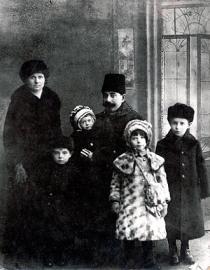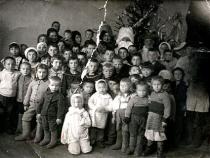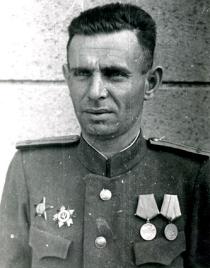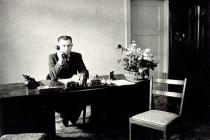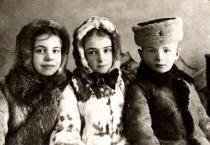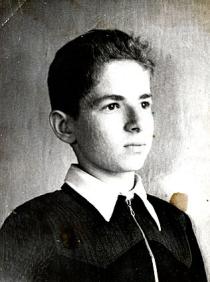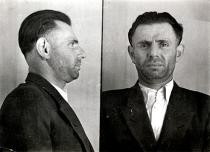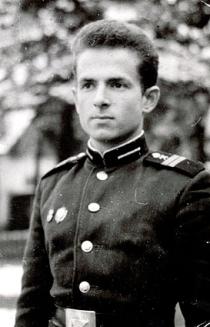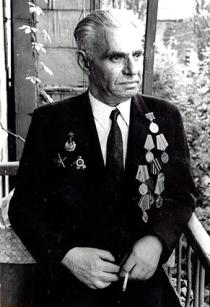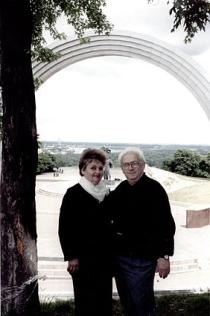My father Isaac Stel'makh in 1962. Celebration of Victory Day in Kreschatik [Kreschatik is the main street of Kiev.]. There was a big official celebration of Victory Day in 1962. As for my father, it was always the best holiday for him. I took this photograph.
In 1941 my father finished his artillery school in Gorliy town and went to the front. Fate guarded my father, though he was wounded several times. After hospitals he went back to the front. My father reached Berlin. After the victory he got in a car accident and stayed in hospital Sharita in Berlin for almost a year. Then my father resigned from the army, but was assigned to the Soviet Military Administration of the town. In 1947 he came to take us to Berlin. We were taken to a wonderful apartment of 8 rooms. I don’t know what position my father had, but we had a nice life.
On 20 January 1949 state security officers came to my father's office and asked him to follow them. He didn't understand at once what it was about. Only when they asked him to take off his tie and untie and remove his shoe laces, he understood that he was arrested. He was accused by article 58, item 10: anti-Soviet agitation and propaganda. He was taken to Spandau, a prison in Berlin. For ten months my father underwent tortures during interrogations. In November 1949 the investigation officer said that if my father didn't sign his confession, he was to be 'acted' on the following day (in the NKVD language it meant that a person was killed and an 'act for death from a heart attack' was issued). My father was thinking all night through. He decided to sign the confession or he would die. He thought of saying that he was forced to do this in court. My father still believed that this was misinterpretation of the party policy and that the just Soviet court would know what was right. The interrogation officer said this was quite another matter. Next day the investigation officer read to him that by decision of the special meeting he was sentenced to 10 years in jail.
After Stalin's death those prisoners who were innocent victims of his regime began to return home. In September 1954 my father was released. He was not rehabilitated, though, but, as his certificate of release indicated, his sentence was reduced from 10 to six years, and he was released before term for good performance and behavior. My father was not allowed to live in Kiev. His residential town was to be Belaya Tserkov in 100 kilometers from Kiev. On 14 August 1956 the Military Collegium of the supreme Court of the USSR reviewed the case of Isaac Stel'makh and closed it for absence of corpus delicti. My father was rehabilitated.
When he returned in 1954, he settled down in Vasilkov. He couldn’t find a job due to his sentence of imprisonment. Later he managed to get a job. After rehabilitation my father began his efforts to resume his membership in the Communist party. I was always surprised that after Stalin’s prisons and camps my father was convinced through his life time that those were acts of enemies of the Soviet power, ideas of socialism and communism were the most significant for him. I even envied his moral and political firmness, though I felt sorry for him: he was a very nervous, impulsive and very vulnerable man. He went to Moscow where he got an appointment with Shvernik, secretary of the Central Committee of the Communist Party, and they resumed his membership in the party and returned all his military orders. My father came home inspired. He went to work at the Knigotorg, a book selling department, and shortly afterward he managed to receive an apartment in Kiev where we moved.
It was a nice three-bedroom apartment in the center of the city. We could finally live as the family of six. My father soon became director of the catering trust and a well-respected man.

